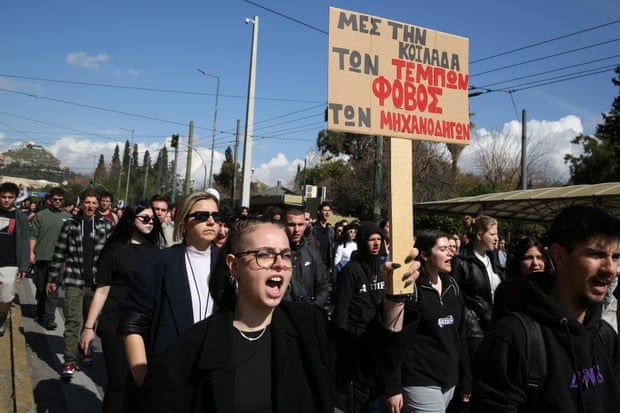
Greek train crash: effort to find bodies expected to end as anger grows
Rescuers are expected to wrap up efforts to find the bodies of victims of a head-on collision of two trains in central Greece, as anger grows over the deadly crash.
Three days after the Thessaloniki-bound passenger train slammed into an oncoming freight train outside the town of Tempe, killing at least 57, the operation to locate missing passengers would likely be concluded, officials said.
“Cranes have moved the [first] two wagons … facilitating the search,” said the fire brigade spokesperson Vassilis Vathrakoyiannis. “It’s estimated that the operation will [soon] be completed.”
Authorities previously announced that 56 people remained unaccounted for in the days that had elapsed since the crash. The high-speed train was carrying more than 350 passengers when it exploded into flames before being thrown off the tracks and into a gorge more than 200 miles (320km) north of Athens.
As hopes faded of finding the living or dead, the focus turned to returning the remains of victims to families. Officials on Friday said with the help of relatives giving DNA samples, 54 victims had been identified, but that the force of the collision was such the process was taking longer than expected. In temperatures that exceeded 1,300C, those travelling in the three worst-hit wagons, at the front of the train, were almost certainly incinerated, with only a young man seated in the area, who has since had multiple operations, surviving.
 Protest against Hellenic Train after the crash in Greece.
Protest against Hellenic Train after the crash in Greece.
Forensic scientists have had to identify victims – almost all university students – through distinguishing factors such as tattoos and earrings.
By order of the health ministry, bodies will be returned to relatives in sealed caskets “for psychological reasons”. In a nation where families often say their final farewells before open coffins, the ministerial decision has been controversial and added to sense of collective distress.
Friday marked the third day of official mourning in Greece with flags flying at half-mast from the Acropolis, museums and public buildings. But increasingly it is fury that is being felt over a collision widely perceived as preventable.
Railway workers prolonged industrial action in protest over safety standards – and more generally the appalling conditions of the Greek railroads, starting with the absence of proper signalling – and students demonstrated nationwide, vowing to be “the voice of the dead” and demanding justice. In Athens thousands took to the streets chanting “their profits, our dead”.
Hellenic Train was among an array of public utilities privatised at the height of the country’s debt crisis. In 2016 it was acquired by the Italian state railway group Ferrovie dello Stato (FS) Italiane.
The company inaugurated its new high-speed electrified passenger train service between Athens and Thessaloniki last year, stating on its website that at speeds of up to 250km/h trains could carry passengers from one to the other in less than four hours. Tuesday’s doomed Intercity train was running that route before it collided at more than 100 mph into the oncoming cargo train taking freight from Thessaloniki to Larissa.
Throughout the week irate protesters have gathered outside the heavily guarded company’s headquarters in the Greek capital. On Friday they did so again shouting “murderers”, a word demonstrators then spray-painted in red across the office block’s windows.
By nightfall clashes had erupted in Syntagma Square, the capital’s central plaza, between rock-hurling youths and police firing teargas. Similar scenes unfolded in Thessaloniki.
The crash occurred within minutes of the train pulling out of Larissa, the main junction in central Greece whose arrested stationmaster will testify before a magistrate on Saturday.
The 59-year-old, who has reportedly admitted his role in guiding the passenger train on to the wrong track, faces an array of charges including involuntary manslaughter and causing grievous bodily harm on a mass scale. His lawyer says while his “devastated” client accepts his role in the disaster, other factors were at play and investigators should not lose sight “of the wood for the trees”.
The investigation has been complicated by uncertainty over the number of ticket holders on the train. By late Thursday evidence had emerged of more passengers boarding at Larissa – a development that could result in the death toll rising further.
“The most important and perhaps biggest mistake made by the rail station in Larissa was that it closed their ticket office at 10pm,” Giorgos Bartzakos, a lawyer representing one of the more than 60 people injured in the collision, told Skai TV. “That’s why it’s been very difficult to get to the bottom of how many people got on the train at Larissa, which we think was over 70.”
The centre-right government of the prime minister, Kyriakos Mitsotakis, which faces elections in the coming months, has vowed that “responsibility will be assigned” for the country’s worst ever train crash.
A three-member panel of experts was announced on Friday to oversee what has been billed as an independent, cross-party inquiry into the collision. But with critics already alleging a cover-up, the announcement triggered a furious response from political parties. The leftwing main opposition Syriza party countered that if the government had been sincere in creating a non-partisan cross-party committee, it should have sought out proposals from across the political spectrum.
“What it really wants is a convenient pre-election result which will validate the verdict that Mr Mitsotakis has already come out with: that everything is [down to] a tragic human mistake,” it said in a statement.











